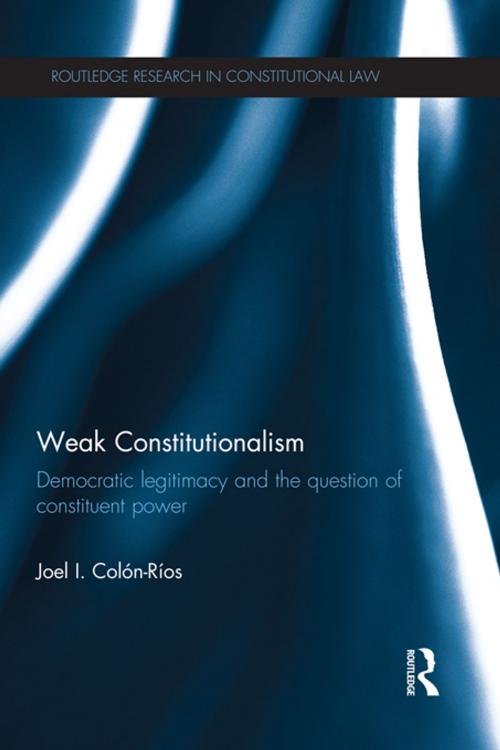Weak Constitutionalism
Democratic Legitimacy and the Question of Constituent Power
Nonfiction, Reference & Language, Law, Comparative, Social & Cultural Studies, Political Science, International, Foreign Legal Systems, Constitutional| Author: | Joel Colón-Ríos | ISBN: | 9781136319266 |
| Publisher: | Taylor and Francis | Publication: | June 14, 2012 |
| Imprint: | Routledge | Language: | English |
| Author: | Joel Colón-Ríos |
| ISBN: | 9781136319266 |
| Publisher: | Taylor and Francis |
| Publication: | June 14, 2012 |
| Imprint: | Routledge |
| Language: | English |
It has been frequently argued that democracy is protected and realized under constitutions that protect certain rights and establish the conditions for a functioning representative democracy. However, some democrats still find something profoundly unsettling about contemporary constitutional regimes. The participation of ordinary citizens in constitutional change in the world's most "advanced" democracies (such as the United States, Canada, and the United Kingdom) is weak at best: the power of constitutional reform usually lies in the exclusive hands of legislatures. How can constitutions that can only be altered by those occupying positions of power be considered democratically legitimate?
This book argues that only a regime that provides an outlet for constituent power to manifest from time to time can ever come to enjoy democratic legitimacy. In so doing, it advances a democratic constitutional theory, one that combines a strong or participatory conception of democracy with a weak form of constitutionalism. The author engages with Anglo-American constitutional theory as well as examining the theory and practise of constituent power in different constitutional regimes (including Latin American countries) where constituent power has become an important part of the left’s legal and political discourse. Weak Constitutionalism: Democratic Legitimacy and the Question of Constituent Power will be of particular interest to legal/political theorists and comparative constitutional lawyers. It also provides an introduction to the theory of constituent power and its relationship to constitutionalism and democracy.
It has been frequently argued that democracy is protected and realized under constitutions that protect certain rights and establish the conditions for a functioning representative democracy. However, some democrats still find something profoundly unsettling about contemporary constitutional regimes. The participation of ordinary citizens in constitutional change in the world's most "advanced" democracies (such as the United States, Canada, and the United Kingdom) is weak at best: the power of constitutional reform usually lies in the exclusive hands of legislatures. How can constitutions that can only be altered by those occupying positions of power be considered democratically legitimate?
This book argues that only a regime that provides an outlet for constituent power to manifest from time to time can ever come to enjoy democratic legitimacy. In so doing, it advances a democratic constitutional theory, one that combines a strong or participatory conception of democracy with a weak form of constitutionalism. The author engages with Anglo-American constitutional theory as well as examining the theory and practise of constituent power in different constitutional regimes (including Latin American countries) where constituent power has become an important part of the left’s legal and political discourse. Weak Constitutionalism: Democratic Legitimacy and the Question of Constituent Power will be of particular interest to legal/political theorists and comparative constitutional lawyers. It also provides an introduction to the theory of constituent power and its relationship to constitutionalism and democracy.















